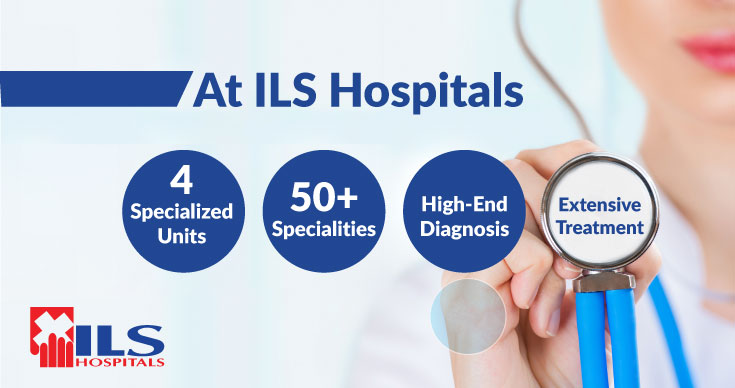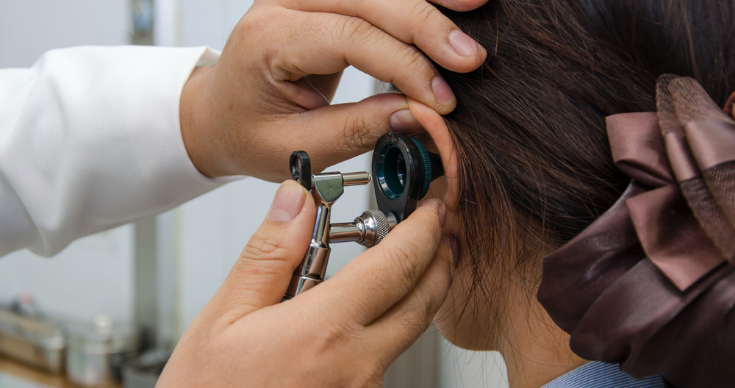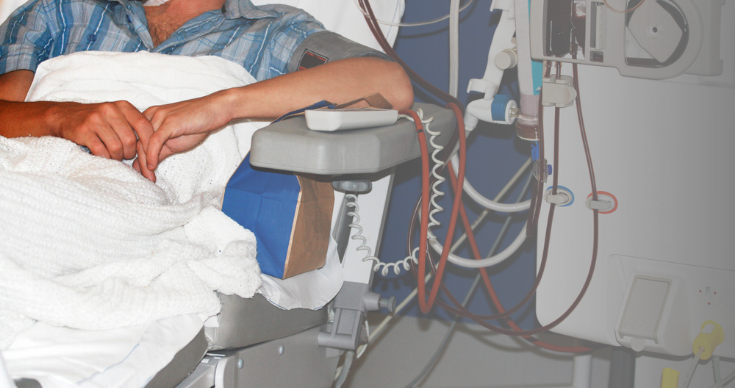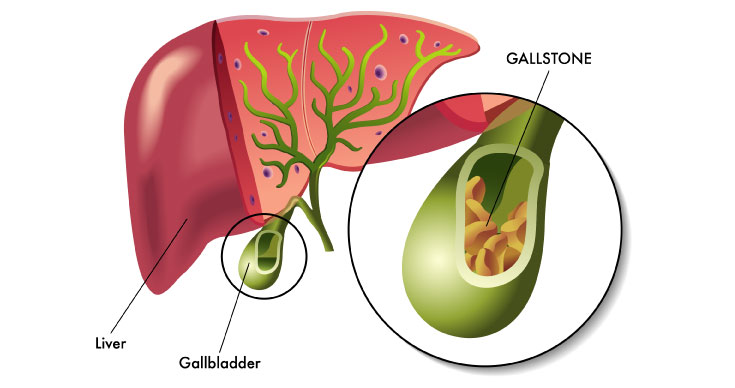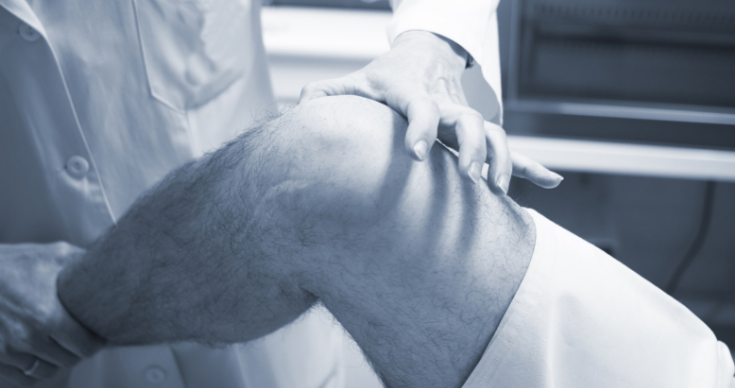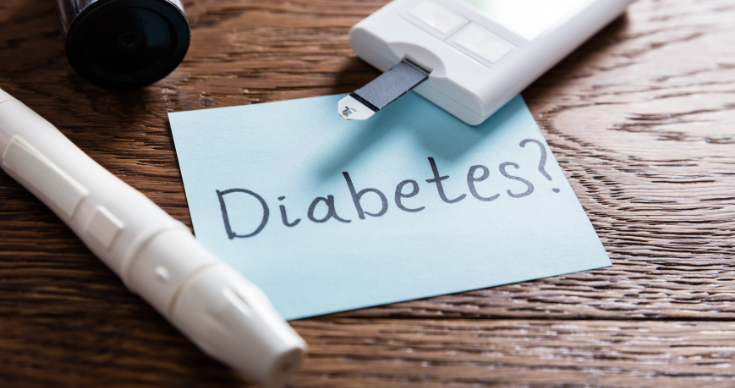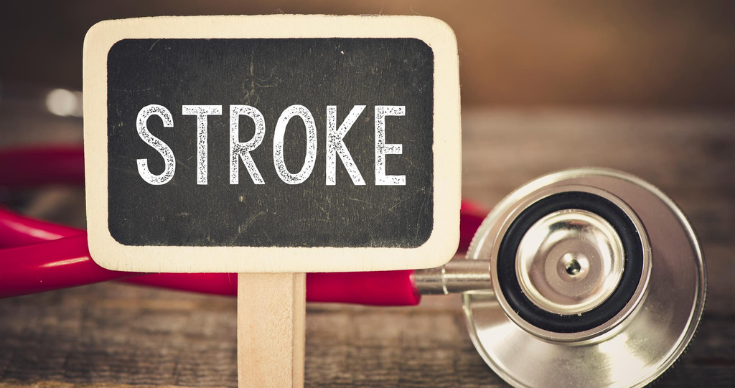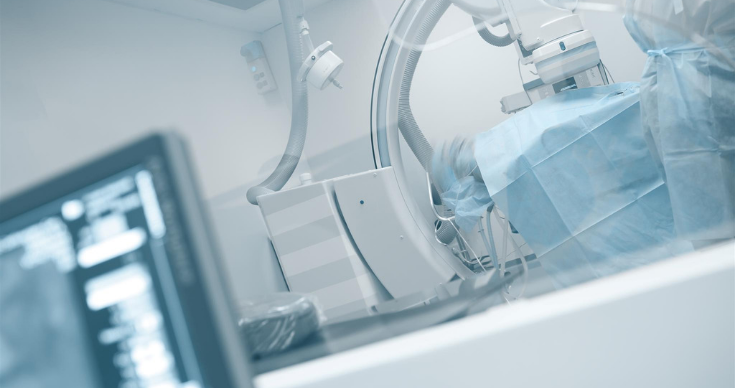What Are Multispeciality Hospitals And How Are They More Beneficial Than General Hospital
Even though we all thrive to stay healthy, staying disease-free is always not so easy in reality. Often you need to go to the hospital and clinics to seek consultation from the doctors and get medical screening at the diagnostic centers or pathology labs. While you look for the best hospital, you are certain to come across 2 types of hospitals, general and multispeciality hospitals. Today, we will define what are multispeciality hospitals and how they are more beneficial than general hospitals.
General hospitals are a non-specialized healthcare provider that offers primary and general treatment for patients with all types of medical conditions. Multispecialty Hospital, on the other hand, addresses different branches of medicine under one roof and also offer surgical treatment and diagnostic services. ILS Hospitals is a well-known group of multispeciality hospitals that offers quality healthcare for people at an affordable price. It has 4 units, at Salt Lake, Dumdum, Howrah, and Agartala.
Here we list out some advantages that multispeciality hospitals offer.
1. Numerous medical specialties under one roof, which includes, but not limited to the following:
General Medicine, ENT, GI specialist, Dermatology, General Surgery, Opthalmology, Neuro medicine, Neurosurgeon, Cardiologist, Cardiothoracic surgeon, Pulmonology, Rheumatology, Orthopedic, Gynecology & Obstetrics, Nephrology, Pediatrics, Urology, Endocrinology, Plastic surgery, Dentistry and many more.
You can also find inter-specialties such as Neuro-Ophthalmology which is an interdisciplinary specialty between neurology and Opthalmology. It focuses on the diseases that originate due to some neurological reasons and affect the vision of the patient.
2. It offers high-end diagnostics which includes both general pathologies such as blood profile screening, x-ray scanning, USG, along with critical diagnosis such as cath lab, doppler test, etc.
3. It stays open all day, all around the year and also offers treatment for medical emergencies. It offers 24/ 7 emergency service, along with ambulance services, pharmacy, assistance with the blood bank, ICU, NICU, PICU, etc.
So, as you can clearly see, going to a multispeciality hospital is a much advantageous decision. In case you are not sure which doctor you should refer too, coming to a multispeciality hospital is your best option as they will help you get in touch with the most suitable doctor.
ILS Hospitals is a multispeciality hospital that offers extensive treatment. Come at ILS Hospitals to address a wide range of health conditions.
Important Signs Of Ear Infections You Should Watch Out For
Are you feeling pain or fullness in your ears for some time? Not sure if it is serious enough for you to seek a doctor yet? It is sometimes difficult to diagnose the symptoms of ear infection. Infections mostly occur in the middle and inner ear and accordingly their symptoms may differ.
Today, we will list out some most common signs of ear infection.
1. Pain Or Discomfort In The Ears
Mild pain or discomfort inside the ear that can either stay persistent or happen from time to time.
2. Fullness In-Ear
Having a feeling that the ears are filled with some fluid that causes irritation or blockage
3. Hearing Loss
Reduced ability to hear properly is a warning sign of severe ear conditions, that requires immediate medical attention.
4. Persistent Pressure In The Ear
Having constant pressure inside the ear, (like you experience during a flight) that may or may not cause pain.
5. Pus Drainage From The Ears
Having fluid discharge from the ears that may or may not contain residue of blood. It may also be accompanied by swelling and redness in the ears.
6. Bulging Of The Ear Drum
Puffed up eardrums must be addressed at the earliest as it may indicate severe infection. It may also imply having ear perforation or collapse.
7. Dizziness Or Spinning Sensation
Feeling dizzy or experiencing vertigo without any other probable cause such as traveling in a hilly region etc.
8. Loss Of Balance
Having imbalanced while standing up and walking, without reasons such as dizziness or weakness.
9. Ringing In Ears
Hearing a ringing sound in the ears that might either be persistent or periodic.
10. Nausea and Vomiting
Feeling nauseated or throwing up without any other relevant cause that keeps on happening again and again.
11. Irritation And Fuzziness In Young Children
In case the young children are having an ear infection, you can see them crying, fuzzing and touching their ears again and again.
Please take note that these symptoms might affect either one or both ears. Ear infections are quite easy to treat with over-the-counter medicines and ear drops. But, if left untreated, it can lead to severe complications in the future like loss of hearing. So, in case you come across any of these above-mentioned symptoms for more than 1-2 weeks, it is best to get it checked from an ENT specialist. Visit us to know more about it.
How To Prepare For Dialysis – A Patient’s Guide
Kidneys perform the function of purifying the blood, remove excess water and toxins from the body. Dialysis is a procedure that works like artificial kidneys and purifies the blood with the help of advanced machinery. It is done for the people whose kidneys cannot perform its functions anymore.
There are several types of dialysis and it is more common than you might be assuming. However, when a patient is first told that they will need to undergo dialysis, they get scared. Today, we will offer some useful tips regarding how to prepare yourself for dialysis.
Usually, your Dialysis will be done 1 to 4 times a week, and each session takes around 3 to 4 hours. You need to keep the access site clean by washing it before dialysis. Keep your face and access site visible for the staff to keep an eye on, all the time during the process. Dialysis is not generally painful, so while the process goes on, you can be relaxed. You can either read a book/newspaper, watch TV, listen to music or even sleep. Since the machine filters, the blood outside the body and then it is injected back in the body, you might feel cold during the process. So, you can ask for blankets to help you stay warm.
There are some minute complications and side effects that are associated with dialysis. Some occur near the site of injection, these include:
- Bleeding
- Swelling
- Redness
- Tenderness
- Muscle pain
Other side effects are
- Dizziness
- Nausea
- Chest pain
- Breathlessness
- Cramps
- High/low blood pressure
After the dialysis, frequent urination and bloating are quite common. You can also feel very tired and can have body aches. You may need to take rest for the rest of the day as well.
Dialysis can be done at a hospital, doctor’s clinic, pathology center or even at home. However, you and your family members need to have the proper training for the same. Also, it is best to get a doctor or medical staff to oversee the procedure from time to time.
It is quite crucial to ensure that you do not miss your dialysis schedule. However, if you are sick or traveling, you cannot help missing 1 or 2 dialysis sessions. So, in case this happens in your case, don’t forget to inform about the same in advance to your doctor or the team and make arrangements accordingly.
ILS Hospitals offer dialysis facility for the patients suffering from renal damage.
Liver Diseases – Causes And Symptoms
The liver is the largest organ in our body. It helps in digesting our food, stores energy and removes unwanted substances from the body. It is situated right under your rib cage on the right side of your abdomen. Like every organ, the liver can have diseases too. Liver diseases can be genetic or due to pathogens or the consumption of excess alcohol. There are various liver treatment approaches depending on the type of diseases. But how would you know if you have any liver disease? Today, we will discuss some of the symptoms that help detect liver diseases and also, which type of disease is caused by what.
Signs and symptoms of liver disease include:
- Skin and eyes appear yellowish: This is the most common symptom which usually means that you might have jaundice.
- Abdominal pain and swelling: If you are feeling pain and swelling in abdomen regularly, it means your liver is not functioning properly, leading to inflammation of the liver.
- Swelling in the legs and ankles: Due to liver disease, the secretion of a protein named Albumin can become inadequate and can cause fluid leakage known as edema. Due to gravity, this fluid gets deposited in the legs and ankles, causing their swelling.
- Itchy skin: It is caused due to the bile products deposited in the skin.
- Chronic fatigue: This is another common symptom for people with liver problems.
- Nausea or vomiting: If your digestive system is not working properly due to liver problems then you would feel nauseous and it becomes hard to keep your food down which also leads to loss of appetite.
Liver disease has many causes:
- Infection: Liver diseases can occur due to infection by Parasites and viruses causing inflammation that reduces liver function. These viruses can spread through blood, contaminated food or water, or close contact with an infected person. The common types of liver infection are hepatitis viruses, including Hepatitis A, Hepatitis B, and Hepatitis C.
- Immune system abnormality: Some autoimmune liver diseases include Autoimmune hepatitis, primary biliary cirrhosis, etc can affect your liver system as well.
- Genetics: Liver diseases can be genetic where an abnormal gene is inherited from one or both of your parents causing various substances to build up in your liver, and thus resulting in liver damage. Some genetic liver diseases include Hemochromatosis, Hyperoxaluria, and oxalosis, Wilson’s disease, alpha-1 antitrypsin deficiency.
- Cancer and other growth: Liver cancer is a severe liver disease. There are various reasons for liver cancer. One of the reasons doctors have found is regular and heavy alcohol consumption. Another type of cancer is bile duct cancer which also happens due to the same reasons.
- Fat accumulating in the liver: Eating unhealthy food is pretty common these days which is why fat accumulation in the liver has become very common as well.
If you have any of the aforementioned symptoms, it might imply that you have some underlying liver disease. It is best to get these symptoms evaluated and avail liver treatment as soon as possible, to lead a healthier life ahead.
A Brief Introduction To Gallstones And Gallstone Surgery
The gallbladder is a pear-shaped organ, located in the upper right side of the abdomen, right under the liver. It secretes bile juice, which helps in digestion. When this digestive enzyme solidifies, it forms hard, gallstones. Gallstones are of 2 types, cholesterol stones (when too much cholesterol is present in the bile) and pigment stones (when too much bilirubin is present in the bile). It is becoming very common these days and thus, a lot of hospitals are offering gallbladder stone surgery. Let’s understand some important aspects of the same, in details.
Symptoms Of Gallstones
Gallstones can arise in any number or size. Thus, the exact symptoms vary greatly from person to person. Many a time, gallstones might not project any symptoms at all (known as silent gallstones). However, the most common symptoms of gallstones are as follows and can persist anywhere between a few minutes to a few hours-
- Intense pain in the middle abdomen
- Pain in the right upper abdomen
- Pain in the right shoulder or between shoulder blades
- Nausea and vomiting
Though these symptoms can arise due to other conditions as well, if it persists for more than 2-3 weeks, it is best to get it evaluated to know the exact reason.
Causes Of Gallstones
Gallstones can happen to anyone. But few risk factors uplift the chances very much. These include-
- Having a family history of gallstones
- Having a personal history of gallstones
- Being overweight or obese
- Being pregnant
- Being 40 years or more
- Being female
- Being on a crash diet for weight loss
- Eating too spicy/oily food
- Eating a low-fiber diet
- Leading a sedentary lifestyle
- Having high cholesterol
- Having liver diseases
- Having diabetes
- Losing weight rapidly
- Taking medicines containing estrogen (like oral contraceptives)
It is important to evaluate oneself whether or not they are at risk of having gallstones. As a preventive measure, losing weight slowly, maintaining healthy body weight, and leading a healthy lifestyle is helpful to reduce the chances of the same.
What Is The Treatment For Gallstones?
If gallstones are left untreated, these can lead to complications such as inflammation of the gallbladder, blockage of common bile duct/ pancreatic bile duct and rarely gallbladder cancer. Thus, it is crucial to seek treatment for it, on time.
Gallstones can be treated by oral medication, shock wave lithotripsy and gallbladder stone surgery. Oral medical and litho stock therapy removes the stones by dislodging them, but often it takes many years to treat it completely if there are many gallstones. Moreover, once the therapy or the medication stops, the gallstones recur and for some people, the therapy or medicines simply don’t work.
Thus gallbladder surgery often remains the only option to treat gallstones permanently. In this surgery, the gallbladder is removed altogether so that gallstone can never recur in the future. These days, many doctors offer laparoscopic gallstone surgery, which removes the gallstones (along with the gallbladder, if needed) through few minute incisions and thus offers many advantages over open gallstone surgery.
The suitable method of treatment is determined by the doctor, depending upon your symptoms, complication, and compatibility. Come at ILS Hospitals for consultation and to get safe and effective gallbladder stone surgery from highly skilled GI surgeons.
Reasons For Considering Joint Replacement Surgery
Do you often complain of joint pain, especially of hips and knees? Your pain medicines are not working anymore? Then perhaps it is time for you to consider for a more reliable treatment for the same. Orthopedic clinics often find people approaching them with a complaint of intolerable pain and discomfort. At some point, it becomes an utter necessity to operate at the earliest convenience.
So, today we offer some tips on how to determine when you should consider getting joint replacement surgery. Though the symptoms and difficulties might vary from person to person, the following symptoms usually remain the same.
1. Joint Pain That Keeps You Up At Night
Several times the joint pain becomes more intense during the night as compared to the day time. So, in case your joint pain becomes more intense at night that wakes you up or makes it difficult for you to fall asleep, its time for you to consider joint replacement surgery.
2. You Feel Pain While Taking Stairs
In case you are avoiding stairs as much as you can because of joint pain, you should pay more attention to it. Climbing stairs exert more strain of the joint as compared to walking on plains. Now every individual will be tired to climb too many stairs, but you should seek the medical opinion if you are experiencing pain, even for a climb of 4-5 stairs.
3. You Have Trouble Getting Up
Do you find it difficult to stand up easily, every time you sit on the floor or chair or even on the bed? You might experience pain in either one or both legs (ankle, heel, knee anywhere) and need some support to balance yourself. This is yet another alarming sign that indicates you to consider the joint replacement surgery.
4. You Have Trouble Walking
This is a severe case which usually happens if the knee pain is chronic. In simple words it means, this stage arises only when you ignore your everyday pain and discomfort for a long period. You might even be limping a little from time to time and swelling around the joints is quite common as well. Consider permanent cure immediately if rest or medicine does not work.
5. Pain That Affects Your Everyday Life
In case having a repetitive episode of pain is stopping you from doing your routine work; like going to the grocery, to the workplace or a park nearby, it is a big issue that needs to be addressed as soon as possible. If left untreated, the thing will become worse.
6. Your Pain Management Or Medication Is No Longer Working
Applying ointment, hot water bags, tieing up crepe bandages and drinking hot milk might work for a short period, but they are not the solution for joint pain in severe cases. Moreover, for many, even the over-the-counter drugs aren’t that effective either. It is recommended to consider surgery for such individuals.
Joint replacement surgeries work wonders if they are availed from experts of some good orthopedic clinics. It not only helps to get relief but also improves mobility that contributes towards making a healthy living ahead. In case you too are suffering from the same, come at ILS Hospitals to seek consultation from expert orthopedics and avail joint replacement surgery.
Diabetes And Its Harmful Effects On Overall Health
Diabetes is a medical condition which is becoming so prevalent around us these days. Until 2-3 decades ago, it was considered to be the old people’s disease, but now, young people are also seeking diabetes treatment. Many diabetes clinics, report having young children falling prey for diabetes as well. Let’s discuss what harmful effects diabetes has if it is left untreated for long or is poorly managed.
1. Slow Healing
Slow healing is the most common condition among diabetic people. Carrying out any invasive medical treatment is very challenging for the same reason. Any minor or major cut, burn, blister, etc does not heal quickly for the diabetic patients. This mostly happens in hands and feet. In rare cases, it can also lead to foot or toe amputation, when it is left untreated over a long period.
2. Kidney Damage
Having kidney failure or severe kidney disease is also a likely scenario in the case of diabetes. The patient might end up needing dialysis regularly or seeking advanced renal transplant.
3. Heart Conditions
Diabetes affects how the heart and its surrounding blood vessels work. As a result, risks of having high blood pressure narrowed blood vessels due to plaque built up is quite common too.
4. Eye Disease And Damage
Diabetes brings many vision-related complications as well. Cataract, glaucoma, eye nerve damage, etc. are some of them. In many cases, it can also lead towards blindness that can only be managed but cannot be cured.
5. Skin Diseases
Diabetes cause dry skin, skin irritation, itching, and many other complications. Moreover, slow healing often leads to cracked skin which in turn brings fungal and bacterial infections.
6. Nerve Damage
Prolonged or mismanaged diabetes causes numbness, tingling sensation in the finger and toes. It damages the foot primarily and the affected area keeps on expanding gradually. When the sensation in the feet gets severely damaged, it leads to a condition called the diabetic foot.
7. Gums And Jaws Condition
Having excessive blood sugar can cause gum disease and loose teeth. Diabetic people often complain of bad breath as well, in spite of maintaining good dental hygiene.
8. Frequent Urination
Diabetes can cause frequent urination as well, but it is more frequent among diabetic patients. Though it is not a life-threatening condition, it does hamper the quality of life and professional life of patients, especially who are engaged in work that requires them to travel a lot, on a daily basis.
Most of the complications of diabetes develop slowly, over the period, but they can be life-threatening as well. Thus it is always advised to every individual to keep an eye on the blood sugar level, from time to time. Moreover, people who are diagnosed with high blood sugar, are advised to keep a check on the other aspects of diabetes and possible complications. ILS Hospitals offer diabetes check-up package that offers immense help to diabetes patients.
C-Section or Natural Birth – Which One Is Right For You?
Are you pregnant? Accept our hearty congratulations. Certainly, you are under the care of some expert Gynecologist and Obstetricians and have plans to deliver your baby in some good maternity hospital when the time comes. Often we find many pregnant women, especially the first-timer mothers are not very certain about which birthing method is right for them. Though it often needs to be decided by both the parents and the doctors, and that too after considering many factors. But today, we are offering a brief introduction about both C-section delivery and natural birth.
What Happens During Natural Birth?
Natural birth is also known as vaginal delivery. As the name itself implies, during natural birth, the baby is born through the birth canal. It is carried out as the uterus exerts strong contractions, pushing the baby out. Until the C-section delivery started being offered by maternity hospitals, this has been the only method of childbirth since the dawn of the human race. Mothers who deliver vaginally are often discharged from maternity hospitals much earlier than those who had C-section delivery because their recovery period is very short.
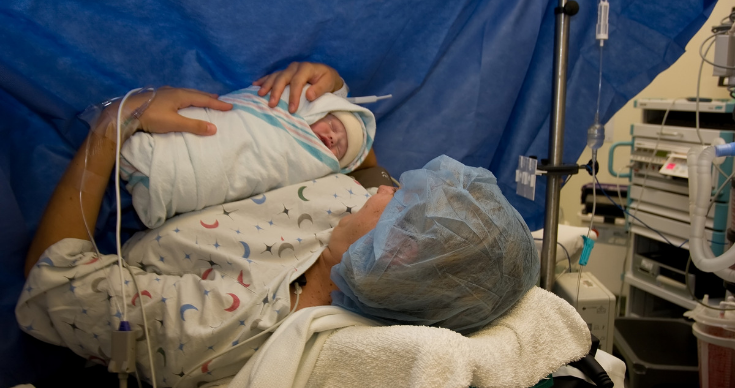
The Special Case Of Painless Delivery
You might have heard of a relatively new way of delivering baby, through ‘painless delivery’. It is carried out naturally, but with the administration of the epidural injection, that manages the pain significantly.
What Happens During C-Section
Cesarean section, or more commonly known as C-section is a comparatively newer method of childbirth. It is carried out by making an incision of length 4 to 6 inches across the lower abdomen and then on the uterus to pull the baby out. C-section can be done on both elective and emergency basis. Many a time, it is preferred and requested from the mother, when she does not want to strain herself due to labor or have long term complications such as urine incontinence, etc.
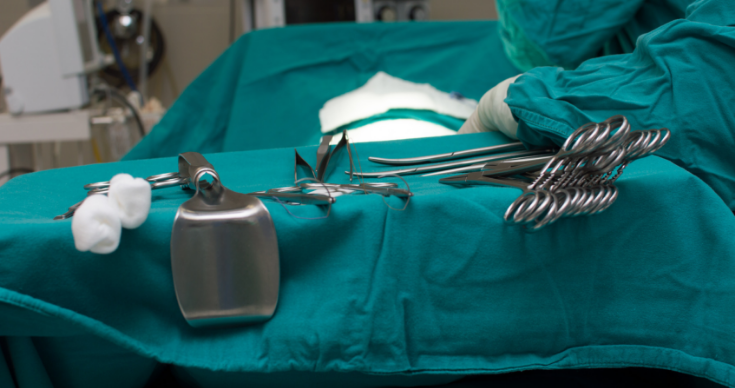
When C-Section Becomes Necessary?
As mentioned earlier, there are many reasons for opting C-section ( mainly due to medical reason). These are often diagnosed by the doctor during pregnancy or during the labor itself when the complication arises. These includes:
- The baby is larger than usual/ or the baby has a large head
- The mother has a small pelvis
- The baby is lying in head-up position (i.e breech baby)
- Twins sharing a same amniotic sac
- The mother is unable to deliver naturally
- The mother is exhausted due to strained labor
Which One Is Better For Me
Honestly, there is no particular answer for the same. For normal pregnancy without any complication, a mother can go for a natural birth, if she thinks it is best. But in case she does not want to strain herself or have any medical complications associated with it, C-section is a preferred approach. In either case, it is advised for every parents-to-be to stay prepared for both approaches.
ILS Hospitals offers both natural and C-section delivery. Get in touch with our expert Gynecologist and Obstetricians to determine which is best for you.
All You Need To Know About Stroke
A medical emergency can happen any day, any time, with or without any warning signs. The most common medical emergencies in Kolkata are a heart attack, stroke, cardiac arrest and road accidents. Often people assume heart attack and stroke to be the same thing, but they are not. Let’s understand some crucial aspects of stroke in brief.
What Is a Stroke?
Stroke is a medical emergency which occurs when blood flow to the brain stops and as a result, the brain cells begin to die. A heart attack is a similar medical emergency in which the supply of blood to the heart stops.
There are 3 kinds of stroke, namely
- Ischemic Stroke – When an artery is blocked
- Hemorrhagic Stroke – When a blood vessel is ruptured
- Mini Stroke (Transient Ischemic Attack) – When a blood vessel is damaged temporarily
Though a mini-stroke doesn’t have any long term effect on health for most people, some patients are left with some disability for life. A mini-stroke also uplifts the risks of having a stroke in the future, significantly.
What Are The Symptoms Of A Stroke?
As already mentioned, stroke is a medical emergency and during stroke every second count. Thus it is crucial to be able to identify stroke on time. But identifying stroke can be challenging for people in general. In this regard, we all should be aware of a simple acronym FAST. So, if you suspect anyone to have a stroke, check the following.
- Face Dropping – Ask them to smile to check the facial muscles. If you observe one side of the face to be dropping or if the smile appears to be uneven, it might indicate a stroke.
- Arm Weakness – Ask them to lift both arms and see if they can. Also, check if they complain of numbness in one arm.
- Speech Difficulty – Ask them to check how they respond and see if their speech seems slur or abnormal or if they are able to understand your command.
- Time To Call Ambulance – If any of the above-mentioned symptoms are present, don’t hesitate and call the ambulance immediately.
Apart from these obvious symptoms of a stroke, there are few other minor symptoms as well. These include-
- Severe, sudden headaches
- Blurry vision or difficulty focusing on one/both eyes
- Paralysis/numbness/weakness in body part/s
- Trouble walking or loss of balance
- Dizziness or confusion
- Loss of memory
- Muscle stiffness
- Involuntary eye movement
So, always remember, ‘if you suspect a stroke, then be FAST’. If you are not entirely sure, get it addressed at the nearby healthcare provider. Treatment on the right time will reduce the risk of disability or even death.
The symptoms of stroke may vary depending upon severity. On one hand mild stroke might have a temporary weakness; on the other hand, any sever stroke can end up causing permanent paralysis.
ILS Hospitals is all set to offer accurate diagnostics and prompt treatment for stroke and other medical emergencies. Our expert doctor and paramedic team monitor the patient round the clock, on our ICUs. For more information, visit us.
A Brief Introduction To Cardiac Catheterization
The heart is a wonderful organ that performs the crucial function of pumping blood into the body. Sometimes it happens that the functions of the heart get affected due to some illness or defect. Then it requires extensive treatment and accurate diagnosis, which plays an important role in keeping it healthy. Thus, today, we will discuss one particular diagnostic procedure, the cardiac catheterization.
What Is Cardiac Catheterization?
Cardiac catheterization is a diagnostic procedure that is available in many good heart hospitals, to evaluate the working condition of the heart. It can also evaluate the condition of the heart muscle, valves and the coronary arteries along with the pressure and oxygen level of the blood within the arteries. It can also locate the regions where the arteries get narrowed and can also detect birth defects in the heart if any. Moreover, it can collect some tissues from the heart, as a sample for biopsy.
The procedure is carried out in a cardiac catheterization lab or more commonly known as the cath lab. It helps the doctors identify the problems that are present within the heart or its arteries. It also can be used to unclog the blocked arteries.
Medical Procedures That Can Be Done During Cardiac Catheterization?
Several medical procedures can be carried out simultaneously by a cardiologist, during a session of cardiac catheterization. These include a range of procedure to fix a blockage in the heart such as coronary angioplasty, coronary stenting, balloon angioplasty. It is also used to fix any holes present in the heart structure along with repairing /replacing any valve. Procedures like ablation to treat arrhythmia can also be carried out with it.
How Is It Carried Out?
This is a non -invasive diagnostic technique, even though we have mentioned the catheters is pushed through the blood vessel. It is said so because the incisions are not made on or near the heart muscle. A thin, hollow cannula, known as the catheter is inserted through either an artery or vein. Usually, the site for this is the groin, arm or neck. It is then inserted further to reach the heart. This movement is tracked through the x-ray machine that is simultaneously used during cardiac catheterization.
Once the procedure is finished, the catheter and their equipment are retracted back and the incision is stitched closed.
Usually, the procedure is done while the patient is still awake, but they are given some sedatives to help them manage the pain. However, for procedures like valve repairs, and ablation, general anesthesia is administrated. The procedure mostly does not have any complications. Moreover, the recovery is quite fast and thus the patients can return to their home the same day. But, they might be kept under observation for a couple of more days, if the doctors find it necessary. Moreover, there is rarely any chance of developing any long term complication from it.
ILS Hospitals Dum Dum offers advance cath lab services. In case you have been referred to have cardiac catheterization, come straight to ILS Hospitals, one of the best heart hospitals in Kolkata, and get the best treatment from there, by the expert cardiologists.


